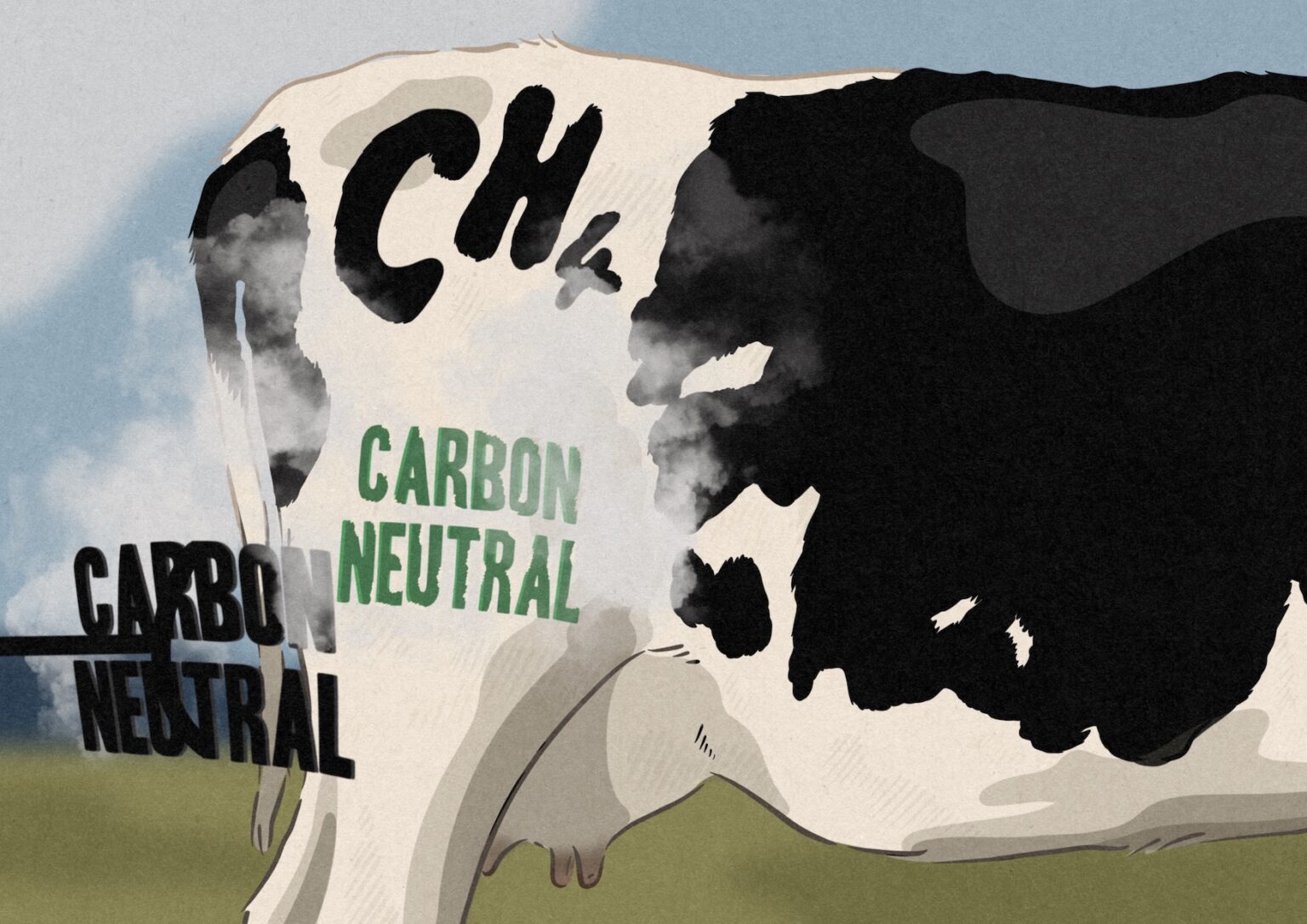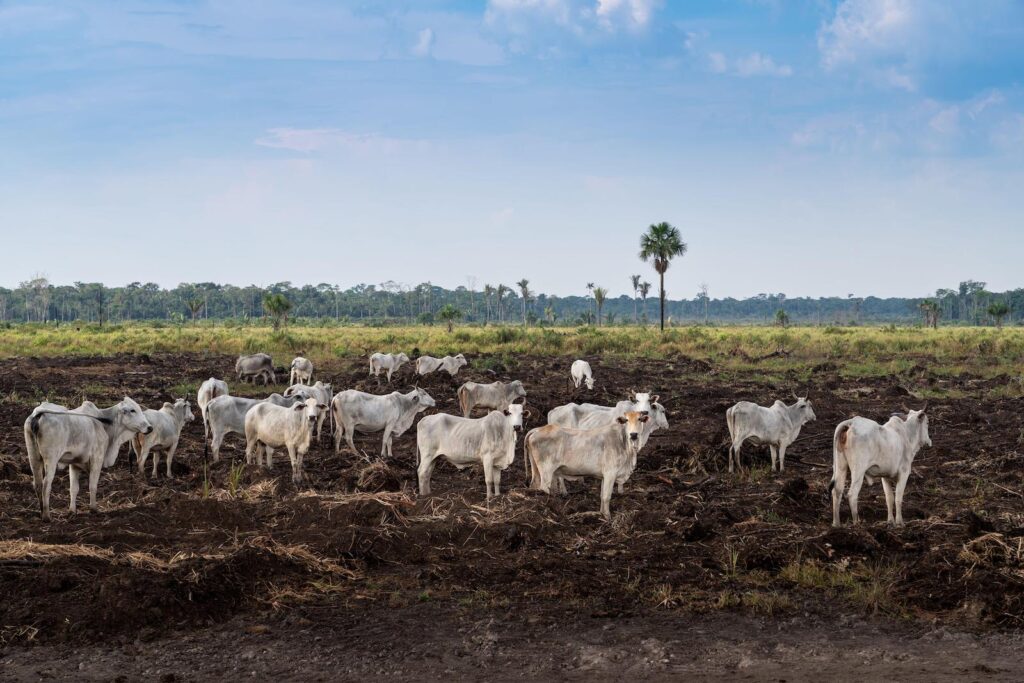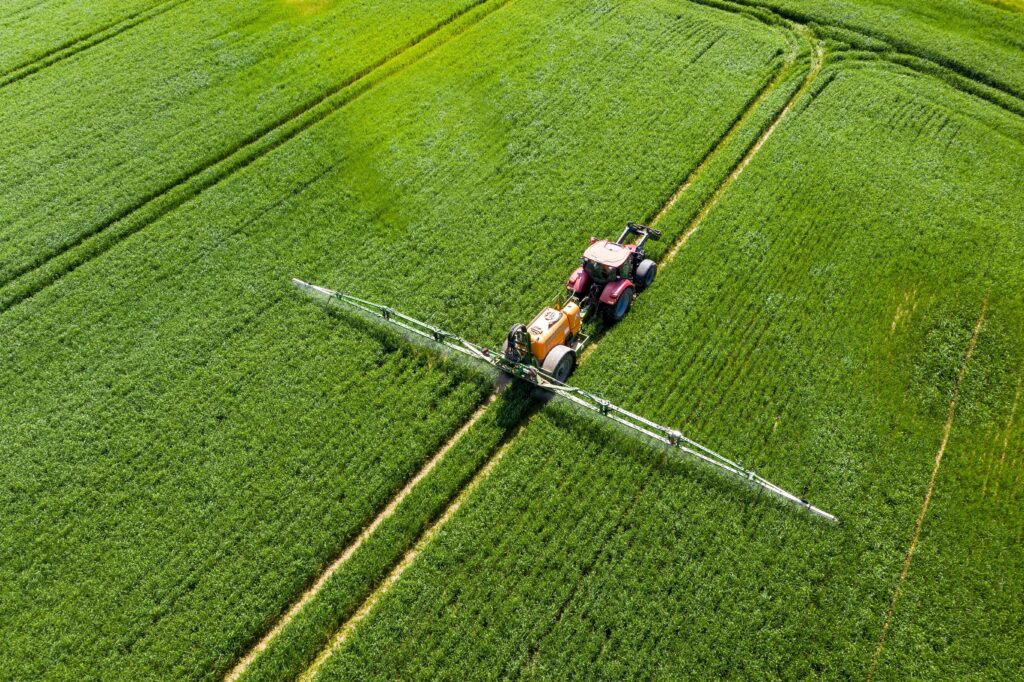In early March, global food giant Tyson unveiled a new beef product line at the 2023 annual industry meat conference. Named “BrazenTM Beef”, it was the first ever product of its kind to receive the “Climate-Friendly” stamp from the US Department of Agriculture.
The brand, which grew out of Tyson’s “Climate-Smart Beef Program”, reportedly earned this badge through securing a 10 percent cut in greenhouse gas emissions compared to regular North American beef.
The company is frank about the product’s marketing strategy. Tyson told the Progressive Grocer it is “trying to be upbeat and different”, with something that speaks definitively to younger Millennial and Gen Z consumers.
Brazen Beef is just one example of how meat and dairy companies are working hard to convince the public and policymakers that a greener, more benign version of industrial animal agriculture is within reach.
It comes in the face of growing public awareness of animal agriculture’s harms – and more talk than ever of the urgent need to cut meat and dairy from our diets to reduce global greenhouse gas emissions.
Powerful corporations are at pains to convince us otherwise. To do so, they draw on friendly science, the promise of technological innovation and slick marketing campaigns – which promise “climate neutral” or “climate smart” meat and dairy – to create the idea we can continue eating vast quantities of the stuff while meeting our climate goals.
These narratives have prompted concern among many scientists and campaigners. They say the industry is overstating its potential for transformation – aided by key researchers and PR professionals – with misleading notions of “clean” or “green” meat and dairy cows.
An Industry Bent on Expansion
A decades-long upward trend of meat and dairy consumption – largely in wealthier parts of the world – has driven beef production to double in the last 50 years.
At the last count, livestock production contributes 14.5 percent of global greenhouse gas emissions, according to the UN’s Food and Agriculture Organization.
The meat and dairy sector claims it can cut these emissions while continuing to grow. But the maths doesn’t add up, and neither does the timeline.
The science shows that for humanity to stay below 1.5C warming, we need to slash emissions dramatically – and at speed. Methane, a greenhouse gas which is belched out in high volumes by cattle, has been identified by the UN and world leaders as the quickest route to cut global heating.
The meat industry is increasingly viewed as a sector where greenhouse gas emissions cuts can and should be made, just like the fossil fuel industry
Livestock accounts for a third of total global emissions of methane, a potent gas that traps heat about 80 times more effectively than carbon dioxide but breaks up more quickly in the atmosphere.
Animal production also emits 65 percent of global nitrous oxide emissions. This gas – which leaches into the air from cow manure and fertilisers – is 300 times better at trapping heat than carbon dioxide and stays in the atmosphere for about 110 years.
In this context, the meat industry is increasingly viewed as a sector where greenhouse gas emissions cuts can and should be made, just like the fossil fuel industry.
New research published in Nature Climate Change in March, which was able to pinpoint the warming caused by livestock emissions for the first time, has added to the pressure.
It found that without decisive action, emissions from the food system alone will push the planet over 1.5C of global warming and made some clear recommendations: deep cuts to meat and dairy consumption in high-income countries, as well as reducing emissions from livestock and manure and shifting to renewable power in the food system.
While beef and dairy producers insist they’re hard at work on the latter two recommendations, they will not countenance the first.
“We’ve looked a lot at each of these companies, and not a single one is saying, ‘we’re going to start to transition away from this system’, or ‘our profit model doesn’t involve continued growth’,” says Ben Lilliston, the Director of Rural Strategies and Climate Change at food systems think tank Institute for Agriculture and Trade Policy.
“They’re all getting bigger. And that means more use of natural resources, and almost inevitably means more emissions.”
Slick Public Relations
Rather than commit to cutting production, the industry has doubled down on telling a different story.
Meat companies and industry groups are working with public relations agencies to spread the idea that shiny new technologies can deliver “carbon-neutral” ruminants (hooved farm animals whose digestive processes emit methane) or “climate-smart” meat products.
In 2020, industry group Beef + Lamb New Zealand claimed that the country’s sheep and beef farms were “close to being carbon neutral”, estimating that vegetation on farms was offsetting “between 63 percent and 118 percent of their on-farm agricultural emissions”.
While the organisation referred to the study as “independent research”, it was commissioned by Beef + Lamb NZ. In a post on its website, the firm sought to reassure consumers that “New Zealand beef and lamb is among the most sustainable in the world, and our farmers are making a significant contribution to addressing on-farm agricultural emissions”.
When contacted for comment, Julian Ashby, Chief Insight Officer at Beef + Lamb NZ told DeSmog of the importance of research that helps meet government emissions targets and consumer expectations, and “allows us to understand the actual warming impact of farming operations, not just the emissions profile”.
The spokesperson said that a later, independent study had found that under one metric “New Zealand’s sheepmeat is arguably climate neutral” and pointed to carbon footprint information on its website. He also differentiated New Zealand’s “more natural, low-impact farming” from other “intensive high-impact systems” practised elsewhere.
The industry’s technological solutions
are geared toward changing the cows,
not consumer behaviour
PR firms in the US have also perpetuated climate-friendly cattle narratives. The industry is heavily invested in protecting consumers’ “right” to eat beef and dairy, and their efforts have opened them up to accusations of greenwashing and misleading advertising.
Look East, a PR firm founded by self-declared “Big Food” advocate Charlie Arnot, runs an industry “trust-building website”. It underplays climate impacts, stating that “research has shown that cows do not produce as much methane gas as was once believed”.
In a similar vein to Tyson’s Brazen Beef, Arnot’s firm often targets Gen Z in particular, brokering influencer-led campaigns to convince the climate-conscious generation that eating meat and dairy can be part of their green ethos.
Another firm, the Wisconsin-based C.O.Nxt – formerly known as Charleston | Orwig – has long specialised in animal-agriculture PR. After working with Exxon in the late 1990s, it has gone on to represent Elanco – the pet and livestock pharmaceutical arm of American pharma giant Eli Lilly – and meat industry lobby groups such as the Animal Agriculture Alliance and National Cattlemen’s Beef Association (NCBA), the beef industry’s largest trade association.
Since 2021, the NCBA has been running the “Beefing up Sustainability” campaign. Its messaging, which paints beef as a climate-conscious choice, has appeared in the New York Times and Washington Post, and is spread by food and nutrition influencers on social media.
These public relations efforts often draw on reports by think tanks and research institutes which have reinforced the idea that industrial animal agriculture could eventually have “net zero” climate impacts.
The Breakthrough Institute, an “ecomodernist” think tank, published “The Clean Cow” in 2021, a report that made the optimistic claim that “low carbon” technofixes and farming practises could “reduce beef’s carbon footprint in 2030 by nearly 18 percent”.
When contacted for comment, Breakthrough appeared to row back from this claim. It told DeSmog that existing technologies and practices can “moderately reduce” the carbon footprint of beef in the US. It also expressed the view that “we should seek innovations and practices that minimise meat’s environmental footprint”.
Industry has relied on reports like this to call for increased government funding for research and development of technology-driven “solutions”.
Journalists too have played a part in helping to foster the notion of the “carbon neutral” cow. While some outlets have subjected the idea to scrutiny, uncritical stories abound in the media about seaweed’s potential to neutralise methane emissions from cows, or how sequestering carbon on farms will cancel out the impact of raising livestock.
The repetition of these ideas creates acceptance around the notion that the industry can solve all of the problems it creates, says Jan Dutkiewicz. The political economist and policy fellow at Harvard University likens the industry’s techno-fix mentality to the fossil fuel industry’s sustained push for carbon capture and storage, a technology as yet unproven at scale.
“It allows people like [US Secretary of Agriculture] Tom Vilsack, like [US Climate Envoy] John Kerry, to basically say we don’t need to talk about aggregate production reduction or consumption reduction, because science will eventually find a way out of this,” he told DeSmog. “That’s the biggest narrative power of these projects and the claims associated with them.”
Industry-Friendly Solutions
Misleading claims about the climate neutrality of beef and dairy (or their potential, future climate neutrality) rest on a foundation of science that can be described as “industry-friendly”. It often gets used by – or spun in favour of – the companies with the most to lose from calls to reduce meat and dairy production.
The technological solutions proposed range from the bizarre to the extraordinary. From masks for cows that capture their methane-packed burps, to genomic editing to breed “low-methane” cows, all are geared toward changing the cows, not consumer behaviour.
Feed additives that work to suppress methane production in ruminants’ digestive system are one such innovation. The feed created by British-Swiss agri-tech firm Mootral – which claims to be “saving our climate one cow at a time” and has used the hashtag #climatesmartcow on its website – has been described by CNN Business as a solution that “can reduce methane in cows and make farmers money”.
Yet while some success has been demonstrated in small-scale trials, for additives like these to have an “adequate impact”, Dutkiewicz writes, they would have to be produced in phenomenal volumes.
In the case of algae – another feed additive under development – industry would not only need to grow enough algae to feed 1.5 billion cows, but also to find a way to transport it to those raised on grass pastures, not just industrial feedlots.
“I think feed additives are just a complete red herring,” Dutkiewicz says. “I’ve seen absolutely zero proof that this is a scalable ‘solution’ to emissions.”
Thomas Hafner, CEO and Founder of Mootral, told DeSmog that “all available routes to methane reduction should be considered”. He insists that the product is a “scalable solution” for farmers to achieve “immediate and permanent reductions of emissions from agriculture”.
Other technologies have problems too. Anaerobic digesters – also known as “biodigesters” or “dairy digesters” – capture methane emissions from organic waste like manure to produce gas that’s burned for energy.
Not only do biodigesters leak, releasing previously “captured” methane from manure lagoons back into the atmosphere, but burning methane also emits other hazardous air pollutants.
Jan Dutkiewicz concludes that serious economic, logistical and scientific hurdles still stand between industrial animal agriculture’s green promises and reality.
Industry-Friendly Science
As well as elevating its own preferred climate solutions, the meat and dairy industry has a long history of challenging independent, peer-reviewed science around climate change.
One of the meat industry’s outspoken allies in academia is Dr. Frank Mitloehner. An animal scientist who specialises in air quality at the University of California Davis, Mitloehner has repeatedly endorsed industry initiatives to cut emissions.
“I’m in the camp of people who say we need to reduce methane aggressively,” he tells DeSmog. “We are working with a sector that we know is a major producer of these gases, to reduce these gases. And I support that through research, and working with the agricultural sector to disseminate what kind of mitigation works.”
Mitloehner is a controversial figure. In 2006, he famously challenged the methodology of the UN’s landmark Livestock’s Long Shadow report. Its calculation – that the sector emits about 7.1 gigatons a year – put meat and dairy on the map as a major greenhouse gas emitter for the first time.
(The report’s calculation of agriculture’s climate impact was later amended to align with Mitloehner’s critiques. The amount of absolute emissions attributed to livestock remained the same, but the percentage in relation to total global greenhouse gas output dropped by 4 percent.)
Mitloehner’s research has been highlighted by the industry, and the media, ever since. In November, Greenpeace’s investigative journalism arm Unearthed revealed that Mitloehner’s CLEAR Center at UC Davis had deep ties to meat companies. Almost entirely funded by industry, the Center’s board was made up chiefly of meat industry representatives, and animal feed industry group IFEEDER hired PR firm C.O.Nxt to help name the Center when it was founded in 2019.
Documents also revealed that Mitloehner was the figurehead of “a massive campaign” to undermine the findings of the influential 2019 EAT-Lancet Commission into food, planet and health – which prescribed wealthy countries make deep cuts to meat and dairy consumption – before the Commission’s report was even released.
Miloehner maintains that the meat and dairy industry can be “climate neutral” (the industry prefers this term to “net zero carbon”). But while his research prescribes innovation as the route to curbing methane output, when asked directly by DeSmog, even Mitloehner acknowledges if emissions are to reduce significantly, herd sizes can’t keep growing around the world.
Another industry cheerleader is professor Peer Ederer. An economist and entrepreneur, he co-organised the International Summit on the Societal Role of Meat in Dublin last October. The conference was hosted by Teagasc, the Agriculture and Food Development Authority in Ireland, where beef and cattle dominate the economy.
Ederer has been defending the meat industry’s climate credentials since at least 2020, when he gave a talk at a Parliamentary event hosted by the Global Warming Policy Foundation, the UK’s principal climate denial group. In his presentation “Why Cows are Not Responsible for Climate Change”, he argued that animal products are essential for society to function, and described vegetarian and vegan diets as the preserve of wealthy nations.
Ederer also co-authored and signed the “Dublin Declaration of Scientists on the Societal Role of Livestock”, a document that aims to “give voice” to scientists whose research helps “achieve a balanced view of the future of animal agriculture” and protect the industry from “simplification, reductionism or zealotry”.
Ederer told DeSmog that he is “neither a supporter, member, advisor’ of the GWPF”. He emphasised that he is an independent scientist “who is researching and publishing on scientific evidence” and does not “work for meat and dairy companies”.
Blurred Boundaries
While industry funding is not atypical for agricultural research – over half is now funded by the private sector, according to a 2020 Nature paper – the extent of financial ties between some scientists and the meat and dairy industry has prompted concern.
One problem identified by Jennifer Jacquet, an associate professor in the Department of Environmental Studies at New York University, is that much of the science the meat industry relies upon to make its carbon (or climate) neutrality claims draws on research that has not been published in peer-reviewed academic journals.
“More often than not, they make claims that they’re doing ‘science’, but then it’s not peer reviewed. It’s not refereed,” she says. “So the whole thing from start to finish is really a PR exercise.” Jacquet notes also that this research is rarely published in climate science journals, but instead in those of animal science.
In a 2021 press release, Elanco referenced Frank Mitloehner’s white paper, “Pathway to Climate Neutrality for U.S. Beef and Dairy Cattle Production” (which was co-written by Elanco’s own chief sustainability officer Dr. Sara E. Place), to promote the idea that industrial animal agriculture could actually contribute to “cooling the climate”.
In the words of Elanco’s CEO: “If livestock producers can curb methane emissions by just one third, it can slow the overall rate of warming, creating a cooling effect, achieving climate neutral meat and milk and allowing the world more time to address the more complex and long-term CO2 challenges.”
The same claim was echoed by fellow UC Davis academic Ermias Kebreab in a 2021 TED talk that painted seaweed-based feed additives’ potential to reduce methane emissions in a very optimistic light. (The speech has been viewed at least 1.8 million times.)
“They make claims that they’re doing ‘science’, but then it’s not peer reviewed. So the whole thing from start to finish is really a PR exercise.”
Jennifer Jacquet
When contacted for comment, Kebreab reiterated to DeSmog that “animal attrition, or absolute reductions in emissions through various methods including using feed additives and genetic selection” can slow or reverse the warming impacts of methane.
Elanco told DeSmog in reference to Mitloehner and Place’s paper that it “played an important role in providing scientific education and awareness”, and stated that a section of the white paper has since been published in the peer-reviewed Journal of Dairy Science. In addition, Elanco said that it did not believe animal agriculture would “create absolute cooling”, but a “cooling effect”.
But Professor Peter Smith, Chair of Plant and Soil Science at the University of Aberdeen, describes as “wishful thinking” the idea that cattle can, or will, help cool the Earth’s climate anytime soon.
“Everything we can do to reduce greenhouse gas emissions from agriculture is a good contribution,” he says. Yet supply-side changes will only go so far. Tackling demand – by reducing food waste and consumption of meat and dairy – is the one surefire way to tackle livestock emissions as it will reduce the overall number of cattle.
“Every cow that’s on the planet is emitting greenhouse gases,” he says. “And if you remove one of those cattle from the equation, you remove the lifetime emissions from that livestock head.”
The Spectre of Dietary Change
Ben Lilliston from the Institute for Agriculture and Trade Policy believes that the industry shouldn’t be afraid of change. While truly climate-friendly farming will “probably mean less animals”, he thinks agricultural companies could still thrive.
“I’m confident that farmers and ranchers could still make money,” he says. “In fact, they might make more money, because they would stand to get a better price for what they’re producing.”
The livestock industry has yet to be convinced. It has had some success in blocking meaningful action to tackle emissions. It already lobbied successfully to exclude agriculture from the 2021 Global Methane Pledge agreed at COP26, in which the text simply encouraged “abatement” of methane emissions from agriculture through voluntary action, rather than setting standards as it did for energy and waste sectors.
It’s a far cry from what Lilliston says the industry needs to do to bring about rapid, absolute cuts in the sector’s contribution to global heating: “to set reasonable, strong and very short term targets”.
Jacquet suggests that changes in consumer behaviour will help move the dial. “The idea that consumers could play a role truly terrifies the meat industry,” she says.
Unlike tobacco and fossil fuel industries – which have run campaigns about individual responsibility that shift blame on to consumers – the meat industry says, “‘do not worry about it as an individual, do not change your diet’”.
The “plasticity” of consumers’ diets – the fact that we can shift what we eat for health, environmental or other reasons – could pose a real threat to animal agriculture’s bottom line. Models show that a move to more flexitarian diets – replacing three-quarters of meat and dairy with plant-based alternatives – could cut around five billion tonnes of carbon dioxide equivalent per year by 2050, according to a special report on land from the IPCC. Such a shift would also score major wins for nature-protection and human health.
As consumers adjust their diets for ethical and environmental reasons, we can expect big meat and dairy companies to do everything they can to keep their products – “carbon neutral” or otherwise – on the menu.
You can find out more about the lobby groups, PR firms and individuals advocating for the animal agriculture industry in DeSmog’s Agribusiness Database, which catalogues the work of groups such as the National Cattlemen’s Beef Association and animal agriculture advocates Frank Mitloehner and Peer Ederer.
Edited by Hazel Healy.
Subscribe to our newsletter
Stay up to date with DeSmog news and alerts







